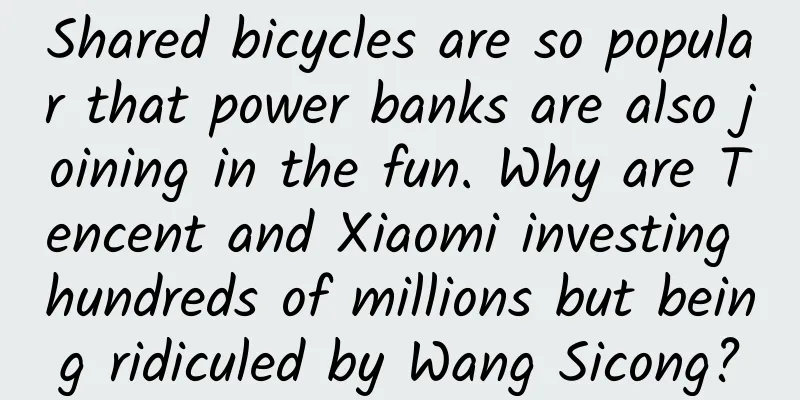Post-WeChat Era: Disputes over Social Apps

|
WeChat has become a tool that people rely heavily on in their lives today. Whether it is work, study, love, or travel, every nerve of ours seems to be closely connected to this social tool. Everyone will sensitively touch their phones when they hear the WeChat message alert. Too many people, apart from work, live in the virtual world created by WeChat every day, and the boundary between this world and the real world is becoming increasingly blurred. We can also use WeChat to buy things and pay with WeChat... Perhaps at the end of the story, we seem to be trapped in a world that is often depicted in "Black Mirror". But will this social world dominated by WeChat come to an end? I think it is hard to see in the short term. As I always believe, it will never be a certain social software that subverts WeChat. This is an old story in the mobile Internet era. The product of the next era will have such subversive power. Social apps other than WeChat Mixed social relationships. In addition to the lag caused by hardware issues, this seems to be the biggest dissatisfaction of most people with WeChat. This is due to the 1.5-degree connections formed by WeChat based on the address book. Most of the people in WeChat are people we may contact at work or in life, and thus expand some of our connections. WeChat's genes also allow Momo, a product based on getting to know strangers, or more bluntly, "hooking up", to grow into a unicorn company under the shadow of WeChat. Everyone wants to wear a mask for hooking up and sexual desire, and WeChat, a product that is tied to too many private social relationships, is obviously not the most suitable. Based on rigid demand and hitting the point that WeChat is difficult to fully cover due to its genes, Momo and the players who follow in its footsteps are undoubtedly the largest in the App camp outside of WeChat, and the capital market is willing to pay for such products. But obviously, whether it is Momo itself or its followers such as Baobao, Tantan, Xindou, etc., what they have done is nothing more than permuting and combining the LBS, Tinder and other models. The core of the whole thing has not changed, and the problem of not being able to settle social relationships has not been properly solved. Therefore, this type of product has a good number of users and activeness, but it can only serve as a traffic entrance for mobile terminals to divert traffic to games, e-commerce, etc. As for the so-called big data analysis of users, it is probably a beautiful lie. Unlike the corporate office collaboration that WeChat has just touched upon, professional social networking can provide more than just IM, but more of a social relationship network. Once this network forms a network effect and gathers enough "insiders", its value will grow almost exponentially. Just look at LinkedIn to see this. However, most of the products that wanted to be the Chinese LinkedIn have come up empty-handed, which is not unrelated to the existence of QQ and WeChat, but it cannot be said that QQ and WeChat suppressed the development of independent professional social networking products. Professional social networking itself is a slow business. It took LinkedIn more than 10 years to complete the journey, and it is obviously impossible to achieve success quickly in the Chinese market where the foundation is weaker. This industry requires sufficient capital support and a long enough time, but these two are contradictory in the current capital game, so few players can be remembered by us. Maimai may be one of them. Maimai, which has been supported by Sequoia all the way to today, was once questioned for its small number of active users and large amount of financing. But now, as more and more people in the Internet circle appear on Maimai, this product based on personal connections is regarded as "useful" by more and more people in the workplace. This is undoubtedly very important, because workplace social networking is different from IM social networking products based on address books. Workplace social networking itself has a strong purpose and tool attribute. Of course, in addition to the startups that enter the market from a small niche, there is another type of product that seems somewhat special in the Chinese social app market. These are social products such as YiXin and LaiWang that carry the mission of giants. As a product of cooperation between the Internet company NetEase and the operator China Telecom, Yixin received enough resources and external attention at the project launch stage. Relying on the preferential policies of Telecom, Yixin has indeed accumulated a sufficient number of seed users. With the strong promotion of NetEase, Yixin has also shown enough Internetization in small details, especially in group chats and picture emoticons. However, judging from the user scale and subsequent development, it is still far away to challenge WeChat, so Yixin has chosen the strategy of following but not following. Due to the loss of its former glory as Fetion, YiXin has been under considerable pressure since its launch. Fortunately, two years later, YiXin has gained a certain market share by relying on free traffic and free calls from operators, and its enterprise version has also obtained good resources from small and medium-sized enterprises. Not only that, YiXin has always been committed to developing emoticon stickers with stories, and the cute and naughty Aji series of emoticons have also captured the hearts of many users. On this differentiated road opened up by emoticon stickers, YiXin is also constantly exploring more opportunities. As for Laiwang, it was even more of a burden for Alibaba. When Laiwang was first launched, Alibaba employees had to run around to get 100 friends. However, Laiwang, which was over-promoted, ultimately failed to build a moat for Alibaba in the mobile social field. As Taobao Mobile and Alipay, two other mobile killer apps, emerged, Laiwang fell out of favor. But as WeChat becomes more and more of a platform, perhaps we really need another social app, and the answer may lie in the products listed above. Platform or tool? Any product hopes to become a platform or even an ecosystem, especially for social products that do not have much monetization ability. E-commerce, games, and advertising have always been the monetization directions of mobile social products. Products that can form a platform can undoubtedly firmly grasp the three and rely on the platform to form more diversified monetization methods, such as WeChat's entry into finance and O2O through payment. However, if it is just a social tool, it is likely that only one of the monetization methods can be used as the main body of the business model, such as Momo, which successfully monetized through games and eventually went public. The gap between the two is the gap between hundreds of billions and billions of dollars. But it is obvious that not every product can become a platform, or the platform only belongs to a few giants. Products from non-giants can only be used as tools to realize their value, and there are no more resources to transform them into platforms. Just like Moji Weather, Toutiao, and even the Chinese Perpetual Calendar, these products have more than tens of millions of daily active users, but they can still only be used as tools to meet certain user needs. In the mobile social field, WeChat has become a platform, or even a WeChat ecosystem, rather than a simple social product. This also means that in some niche demand points, more products will inevitably find their place to do things that WeChat cannot do well or is not good at. People may need one or more social products in addition to WeChat to complete the multi-level social network construction. On another level, it may not be a good thing for WeChat to become a monopoly-level platform, despite the many third-party plug-ins that have just appeared around the official account, service account, and the enterprise account. WeChat often acts as the referee of the entire ecosystem, holding the power of life and death of every participant (such as WeChat's ban on self-media accounts), and can also dive in and become an athlete after discovering a good opportunity. We hope that there is an app that can solve all our online needs in one stop, but we also hope to have more choices, rather than letting our lives be dominated by a single app. Everything seems contradictory. If the birth of Momo is regarded as the beginning of this mobile social wave, then in the past four years of mobile Internet changes, WeChat has gone from relying on QQ offline messaging to attract users to becoming an indispensable part of people's lives. Of course, this process is in contrast to the decline of Weibo, another social product that spans PC and mobile Internet. But we still have reason to believe that the era of WeChat is coming to an end, just before it really dominates our lives. WeChat is still important, but perhaps we need more social apps. |
<<: Experience in optimizing game performance
>>: Microsoft: Android is so big, I want to occupy it too
Recommend
How to choose bandwidth parameters when renting a server?
Server rental includes cloud server rental, physi...
Lenovo S5 review: a 1,000 yuan phone with balanced configuration and no flaws
When Trump took the initiative to start the Sino-...
The prototype of the king in the night is actually an amazed expression pack! !
Beijing Temple of Heaven Park is an important hab...
What does Toutiao’s headline number index mean? How to check the Toutiao account index?
Q: What is the Toutiao Index? What does Toutiao A...
"Forever young" and able to live ten years longer, is there such a good thing in the world?
In Mr. Jin Yong's famous martial arts novel &...
How to build a good reputation for a product during its introduction period?
Today let’s talk about a not very interesting que...
How much does it cost to outsource a mini program? How much does it cost to make a small program?
With the continuous development of mobile Interne...
A brief analysis of mobile Internet advertising fraud methods. How to prevent it?
1. Causes of Cheating Here I would like to first ...
What to do if user churn rate is too high?
User operation is a very detailed job, and variou...
All thanks to strength! The world's largest "artificial sun" ITER main engine installation, China once again undertakes!
On February 29, 2024, local time, the Internation...
Huawei App Market brand resource bidding promotion process!
1. Introduction to brand resource bidding promoti...
Line Korea Technical Manager Shin Seung-yong will attend the Cocos Developer Conference
The Cocos 2014 Developer Conference (Autumn) will...
How to design mobile search? The answer lies in these four parts I summarized
Epik Xiaoliu : Currently, the search function is ...
Tesla recalls 734 imported Model 3s due to risk of loose screws
According to the official website of the State Ad...
How to create your own entry in Baidu Encyclopedia? Is there any method?
Baidu Encyclopedia started in 2006. When it was f...









